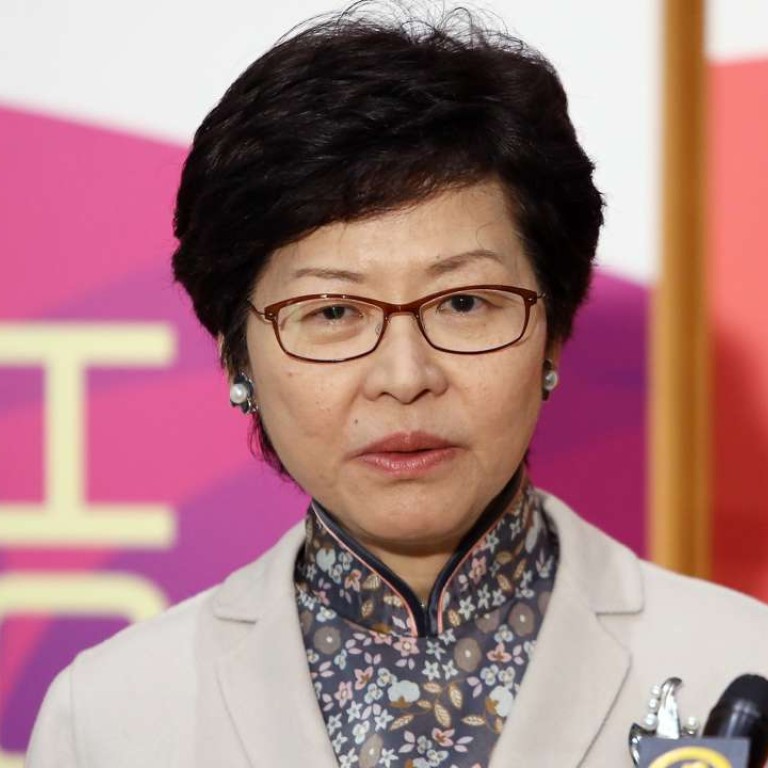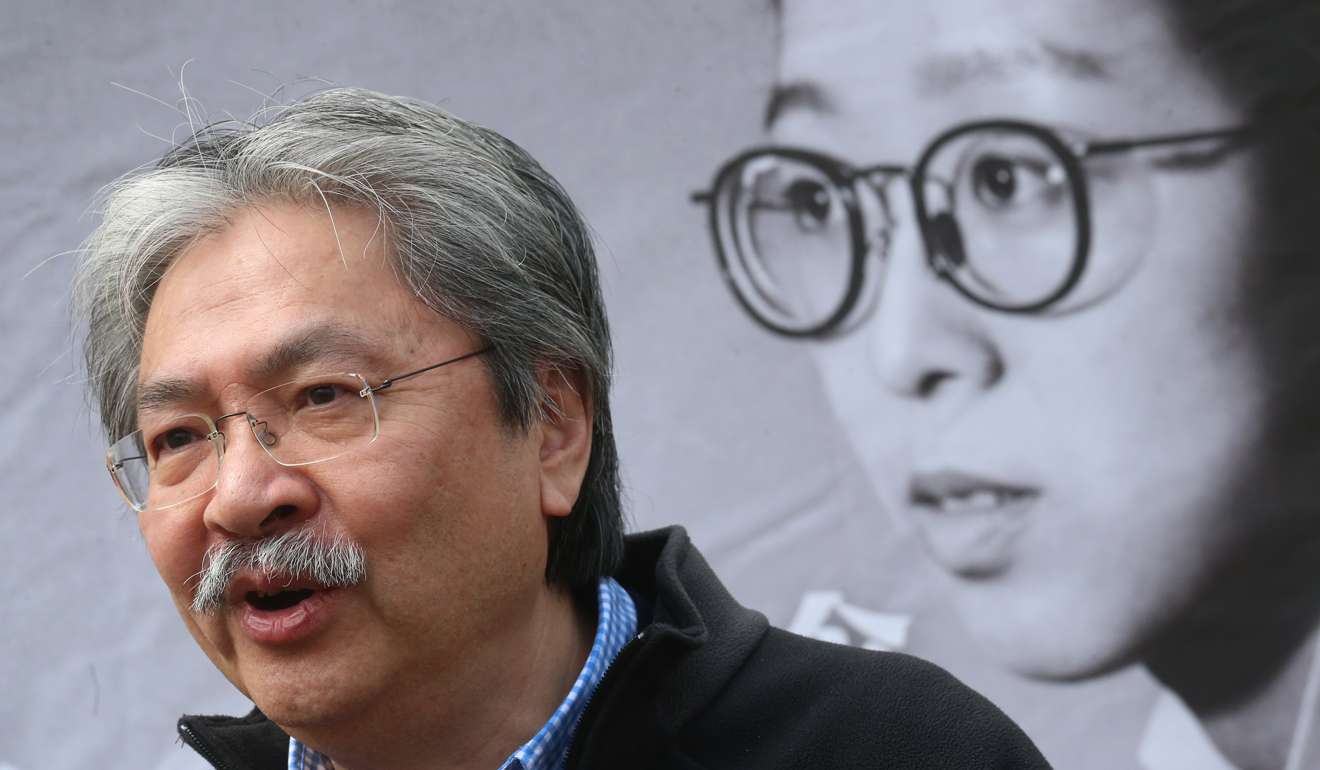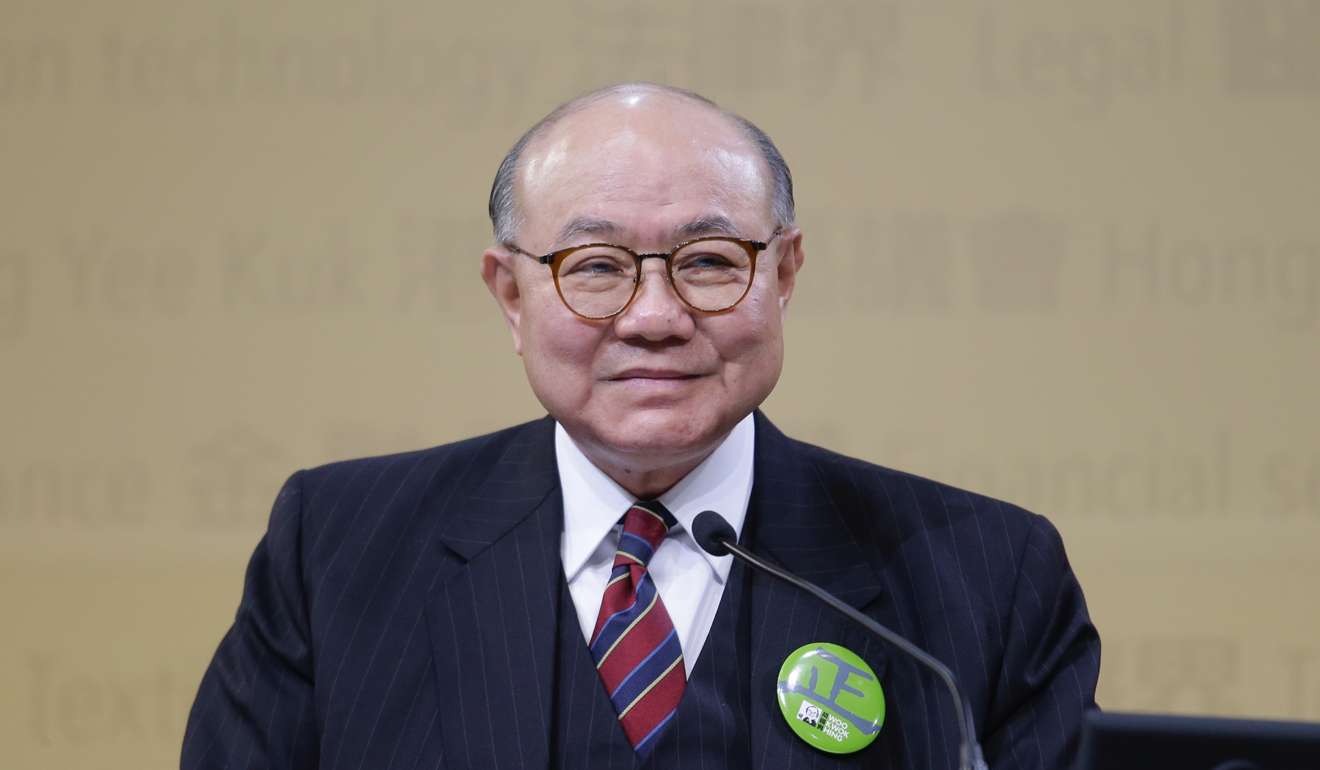
Six questions for Hong Kong chief executive candidates Woo Kwok-hing and Carrie Lam
The Post put questions to the candidates about their priorities, inclusiveness, resignation, independence, housing and foreign judges; John Tsang Chun-wah declined to take part, citing a tight schedule
If you are elected, what do you plan to do in your first 100 days? What will be your top priority?
Woo: My top priority is to reboot the political reform process so that the chief executive can be elected by universal suffrage in 2022. Until and unless this bone of contention over democratisation is resolved, the government will remain a lame duck bogged down by a dysfunctional Legislative Council.
I will appoint a broadly-based consultative conference to sort out labour and welfare issues, including how to implement a universal pension scheme.
As a symbol of social conciliation, I will have the iron gates insulating the Central Government Offices at Tamar from the people dismantled.
I will not take to the woods under any circumstances
Lam: If I am so fortunate to be elected the next chief executive of the Hong Kong Special Administrative Region government, the first 100 days of office for me will start much earlier than July 1, 2017, when the next term of government officially begins. Instead, I’d like to start as soon as practicable after election day on March 26 to address the urgent issues awaiting resolution. As I have stated in my election manifesto, the education sector needs urgent consideration particularly given my proposal for an annual HK$5 billion in new resources to be injected as recurrent expenses.
To achieve that, we need to seek agreement among all stakeholders in the education sector, regardless of political affiliation. Indeed we have to make good our campaign slogan and connect with everyone to heal our divisiveness.
We shall proactively communicate with the different political parties and groups in the Legislative Council to build consensus so as to prioritise the allocation of new resources to the sector to start creating a caring, stable, inspiring and satisfying environment for teaching and learning.
If elected, will you invite your election rivals and their team members to your cabinet? Why/why not?
Woo: I’ll put together my ruling team with members from all key political parties so that their differences can be voiced, debated and resolved at the highest level of government.
Lam: My new style of governance will see us draw widely from the community’s deep pool of talent. On the basis of merit, anyone who has a sincere wish to serve the people of Hong Kong and who possesses the required expertise and qualifications may be invited to join the government and other public bodies, regardless of their political background.
What sort of circumstances would you think would make you unable to continue as chief executive? What is your bottom line?
Woo: I will fight for the common good of the people of Hong Kong under the notions of “one country, two systems” and a highly autonomous HKSAR as prescribed in the Basic Law. I will not take to the woods under any circumstances.
Lam: Article 43 of the Basic Law states that the CE is to be accountable to both the Central People’s Government and the Hong Kong Special Administrative Region, whereas Article 52 specifies the circumstances under which the CE must resign, including when he/she loses the ability to discharge his/her duties as a result of serious illness or other reasons. I shall abide by these regulations if elected. I decided to run for chief executive because I love Hong Kong and I care for the well-being of the seven million fellow citizens of the territory. My priority will be to call on all to set aside our differences and to unite society by connecting with each other to build an even better Hong Kong, reigniting hope for our younger generations.

Woo: The call for independence has no political currency in Hong Kong. I don’t think the government needs to do anything in this regard. Public opinion is staunchly against this impractical and unconstitutional concept of an independent Hong Kong.
Independence for Hong Kong is not a subject that is open for discussion
Lam: Independence for Hong Kong is not a subject that is open for discussion and we must be very clear about it. Article 1 of the Basic Law states that the Hong Kong Special Administrative Region is an inalienable part of the People’s Republic of China. Under the “one country, two systems” principle, Hong Kong now enjoys a high degree of autonomy and our institutions, rights and freedoms are protected under the Basic Law. Our priority should be to try to resolve any discontent and frustration which may exist in society so that we can rebuild mutual trust and start to reunite our society.
Home prices have been breaking new records these days. Apart from the long-term measures to increase land supply, will you launch any immediate/short-term measures to cool down prices after you assume office?
Woo: I’ll streamline the redevelopment of old urban areas, take swift steps to look into how to unleash the potential of the 1,192 acres of brownfield sites across the territory for public housing projects and introduce easy-to-install prefabricated transit housing units on idle sites for those who are on the public housing waiting list and are languishing in subdivided flats or other shabby premises.
I’ll also set aside sites for the regular supply of flats to be designated for local first-time homebuyers only.
Lam: To tackle the housing problem, we must secure more land for housing. Hong Kong is not short of land per se but no land supply option is free from public objection. As far as land creation is concerned, there is simply no silver bullet. The community must examine all land supply options, appreciate the relevant pros and cons and make tough decisions and choices to get land for housing.
If elected, I will establish a dedicated task force representing various sectors to take a macro review of our land supply options, including reclamation outside Victoria Harbour, developing brownfield sites in the New Territories, tapping into the land reserves of private property developers, redeveloping dilapidated urban areas and accessing the outskirts of country parks. The task force will then engage the public to discuss and decide.
I am also proposing to rebuild our “housing ladder” and introduce affordable “starter homes” to meet Hong Kong middle-class families’ home ownership aspirations while keeping to our public housing programmes, and consider pilot arrangements which would provide more affordable rental spaces for the grass roots.
There are increasing demands in the pro-Beijing camp for foreign judges to be replaced in light of the jailing of seven police officers. What is your take on the issue and how do you uphold judicial independence?
Woo: The rule of law is the last line of defence for Hong Kong. It is dangerous to politicise the judiciary. There are only a limited number of foreigners on the bench. In particular, those foreign experts serving as non-permanent judges of the Court of Final Appeal are indispensable in enriching our common law tradition.
Lam: Judicial independence is one of our core values and has a solid foundation in Hong Kong. This is also enshrined in the Basic Law, which states that, with the exception of the chief justice of the Court of Final Appeal and the chief judge of the High Court, there is no restriction on the nationality of judges. Throughout the years, the chief justice of the Court of Final Appeal has spared no effort to maintain the high quality and standards of our judicial officers. Regardless of how we may feel about individual cases, the rule of law must be safeguarded and prevail.

PUT TO THE TEST: HOW THEY TACKLED QUESTIONS FROM EACH OTHER
Lam: In previous drafts of your manifesto, you specifically included the suggestion to have Chinese history as a separate and compulsory subject in junior secondary schools. But in the final version, the suggestion had been removed. What prompted you to do that? Whose opinions did you consult such that you changed your mind?
Woo: Following further consultation with members of the education sector, I removed the suggestion because in most junior secondary schools – up to 90 per cent of them – they already have Chinese history as a separate and compulsory subject. The rest are experimenting with teaching Chinese history in combination with world history or culture and other humanities, in line with guidelines from the Education Bureau since the year 2000. Schools are free to design their own courses which incorporate Chinese and world history, Hong Kong history and cultural developments. The result has been more class hours and a more creative and effective approach that induces better learning in schools.
Woo: Housing was under your portfolio when you were chief secretary. Did you ever ask [housing secretary] Anthony Cheung Bing-leung or his subordinates why they had no record of a third round of “soft lobbying” with rural heads from Wang Chau [over a proposed housing development]? Did you ever ask them to disclose what was discussed at their secret meeting? If so, what was said?
Lam: I am not at liberty to disclose details of any internal discussions within the government regarding the case. It should be noted that the current government held a press conference on September 21 in connection with the case.
Lam: Your experience in public service is concentrated heavily in the legal field. As chief executive it is important to be able to understand the full range of challenges and opportunities Hong Kong faces. With your limited scope of experience, how can you convince people you will be able to lead us well?
Woo: Justin Trudeau had limited experience in government before being elected prime minister of Canada. He is now a popular leader running the second largest country in the world. You seem to have a persistent problem with listening to others. I have written some 2,000 words to explain my philosophy in financial and economic policies in my manifesto. It ranges from industry diversification and expanding the Future Fund to improving the business environment and enhancing governance structures for listing regulations. I will recap a couple of other main points for you. First, I believe in investing in the future. I will take a “balanced budget stimulus” approach to make the best out of our fiscal reserves by boosting research and development. Second, the incumbent government has been sitting on its hands in capitalising on green industries and the sharing economy. Many of our laws, regulations and even tax regime are outdated. We should streamline them to enable start-ups and entrepreneurs to unleash their imagination.
Woo: You pledged to adhere to the “lines of Leung Chun-ying”. Now you seem to have back-peddled. Can you state clearly what policies of Leung’s you would follow and those you wouldn’t?
Lam: What I said and meant was that I will continue to push forward the good policies of the current government, particularly those in poverty alleviation, care for the elderly, helping the disadvantaged, housing and care for the environment. If elected chief executive, I shall, as promised in my manifesto, introduce a new style of governance, new roles for government and a new fiscal philosophy to ensure we respond promptly and effectively to the needs and aspirations of people.
QUESTIONS FOR JOHN TSANG
John Tsang declined to take part in our debate, citing a tight schedule. Nevertheless Woo and Lam had questions for him:
Woo: You talked of a white paper on how to legislate on Article 23 of the Basic Law. You also said you would tackle easier issues first, putting aside the harder ones for later. What exactly will you put into your white paper? And what exactly do you consider easy in legislating for Article 23?
● You said you would have to wait and see on how to proceed with political reform. Given a free choice, what is your timetable and road map to achieve universal suffrage?
Lam: As financial secretary you repeatedly produced budget estimates vastly off compared to the actual numbers ... and claimed “our expenditure every year recorded double-digit growth”. With such a dismal track record and unfamiliarity with your own work, how can people trust you to lead them?
● You have claimed you are uniquely equipped to unite society. However, the vast majority of your nominations came from the pan-democratic camp, and many other people have openly questioned your suitability for the job, including whether you are trusted by Beijing. How do you plan to gain the support of these sectors?

